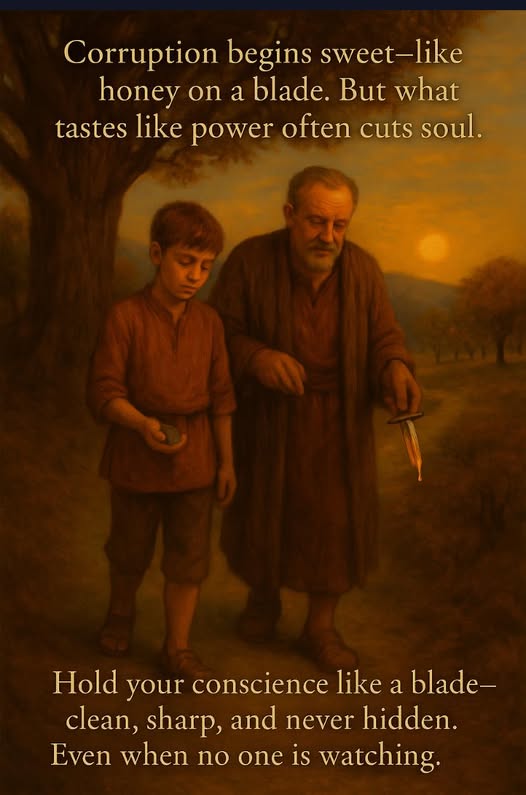
The sun hung low over the hills, casting long golden shadows on the dusty path. Emil walked alongside his grandfather, their sandals brushing through dry leaves. They were on their way to the old well near the orchard—a walk Grandfather called “a walk to draw wisdom.”
“Grandpa,” Emil said, after a long silence. “Why do people become corrupt?”
His grandfather paused for a moment. “Ah, Emil. That is a question with many answers and yet only one truth.”
He picked up a stone and handed it to Emil. “Look at this rock.”
Emil turned it over. It was ordinary—gray and rough.
“Imagine this rock is a person,” Grandfather said. “Solid. Useful. With purpose.”
Then he pointed to a crack running along its side. “Now imagine a drop of poison slowly leaking into this crack every day. Just a little. So little that no one notices. Over time, what happens?”
“The rock breaks,” Emil said, realizing the lesson.
“Exactly. Corruption,” Grandfather said, “is not always sudden. It begins small—justifying a lie here, ignoring a wrongdoing there, accepting favors in secret. One drop at a time.”
They reached the well. Grandfather drew up a bucket of water and poured some into a cup for Emil.
“But Grandpa,” Emil said, “why would someone drink poison in the first place?”
Grandfather smiled sadly. “Because it is often sweet at first. Power tastes like honey to those who are hungry for control. Wealth shines like gold to eyes blinded by greed. And approval? It feels like warmth to the insecure. But none of these satisfy the soul.”
He sat on a stone near the well. “Do you remember the parable of the honeyed dagger?”
Emil shook his head.
“It goes like this,” Grandfather began, eyes softening with the tone of a storyteller.
“A king wanted to test his three sons. He offered each a dagger dipped in honey. ‘Use it wisely,’ he said, ‘and return in one year.’
The first son used it to charm others into doing his bidding, speaking sweetly while cutting deeply.
The second son hid the blade, licking the honey in secret until the taste controlled him.
The third son washed off the honey, honed the blade, and used it to protect the weak.
Only the third returned with clean hands and a clear conscience.
The king made him heir, for he had not fallen for the sweetness that hides the sting.”
Emil nodded slowly, letting the story settle.
“So corruption,” he said, “is when someone chooses the honey and ignores the blade.”
Grandfather looked at him with approval. “Yes. And remember, Emil—sometimes people justify corruption by saying they are doing it ‘for the greater good.’ That is the most dangerous lie of all. It disguises harm as heroism.”
Emil looked into the water’s reflection. “But what if the whole system is corrupt? Can one person still be clean?”
Grandfather cupped Emil’s cheek gently. “A single candle still pushes back the dark. Never let the dirt of others become the excuse for your own stains. The soul is always being tested. Even when no one is watching.”
They sat in silence for a while, the well between them and the quiet orchard around them.
As they turned back toward home, Emil whispered, “I want to be like the third son.”
Grandfather smiled. “Then carry your conscience like a blade—and your words like light.

